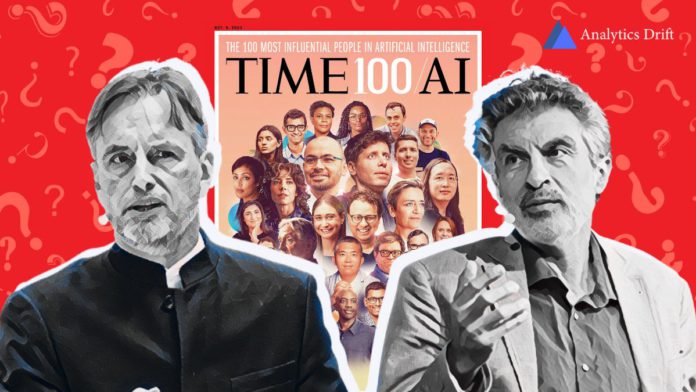TIME magazine recently published its first ever list of the 100 most influential figures in the growth of artificial intelligence. Titled ‘TIME 100 AI‘, the list includes prominent CEOs, researchers, scientists, activists, academics, politicians, musicians, and many more.
Some of the well known names in the artificial intelligence industry, such as OpenAI CEO Sam Altman, founder of various AI initiatives Elon Musk, COO of Google DeepMind Lila Ibrahim, Chief AI Ethics Scientist at Hugging Face Margaret Mitchell, and various others are mentioned in the list.
One might think that the list has managed to include everyone who has made massive contributions or dedicated their life’s work to the lucrative field of artificial intelligence which is advancing by leaps and bounds every day. However, two prominent figures in the AI industry seem to be conspicuously missing from the list, viz. Jürgen Schmidhuber and Yoshua Bengio.
Read More: UK to Invest £100m in AI Chips Production Amid Global Competition
Jürgen Schmidhuber is a German computer scientist who is known for his foundational work on recurrent neural networks (RNNs), including backpropagation and long short-term memory (LSTM). Schmidhuber’s work on RNNs has had a major impact on the field of artificial intelligence. These technologies are now used in a wide variety of applications, including self-driving cars, virtual assistants, and spam filters.
Schmidhuber is also a co-founder of the company Nnaisense, which is developing artificial general intelligence (AGI). In addition to his work on RNNs, Schmidhuber has also made significant contributions to other areas of artificial intelligence, such as genetic programming, reinforcement learning, and artificial curiosity. He is a highly cited researcher and has won numerous awards for his work, which reinforces the argument of his name not being in the list.
Yoshua Bengio is a Canadian computer scientist and a professor at the University of Montreal, who is also known as one of the godfathers of AI. He earned the title along with Geoffrey Hinton and Yann LeCun after winning the Turing Award as a group. He is one of the pioneers of deep learning, a type of artificial intelligence that uses neural networks to learn from data. Bengio’s work has had a major impact on the field of artificial intelligence, and he is credited with helping to make deep learning the dominant approach to AI today.
Some of Bengio’s most important contributions to artificial intelligence include the backpropagation algorithm. He also showed that deep neural networks could be used to recognize images and speech, making him another deserving candidate for the list.
In an article titled ‘How We Chose the TIME 100 Most Influential People in AI’, the magazine said, “TIME’s most knowledgeable editors and reporters spent months fielding recommendations from dozens of sources, to put together hundreds of nominations that we whittled down to the group you see today. We interviewed nearly all of the individuals on this list to get their perspective on the path of AI today.” Despite this brief explanation from the magazine, the selection process for the TIME 100 AI list comes off as rather ambiguous.
Considering all this, it still remains unclear as to why TIME chose to exclude Schmidhuber and Bengio from the list. Either the list has been subjected to personal bias or there has been a serious lack of research on the part of “TIME’s most knowledgeable editors and reporters”. It remains for only time to tell whether objections will be raised as to the credibility of the list, and if so, whether TIME will entertain any of those objections.


